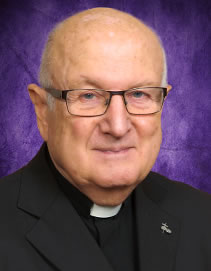
From the Director
As we look back at the last year, there probably are few people who would name 2020 as among their favorite years. Surely, though, we must have learned something from COVID-19, and the Black Lives Matter protests. Certainly, the virus made us stop and think about who are the most essential workers in this country. And the death of George Floyd made the country stop and reflect on how people of color lead their lives – or should have made us reflect on it.
The American Catholic Church, and I mean all of us Catholics, can profitably do an examination of conscience. Although we do not want to admit it, racism “as American as apple pie” and segregation have been part of the life of our beloved Church.
Even our fellow Black Catholics have been long- suffering. Consider the case of Venerable Father Augustus Tolton. He was the first recognized African American Roman Catholic priest in the history of the United States. He was born into slavery in Missouri on April 1, 1854, but his family later escaped to Illinois. He was raised Catholic and later expressed his desire for the priesthood. With the help of an Irish Franciscan, Fr. Peter McGirr, the young Tolton applied to various American seminaries but was rejected by every one of them. He finally applied for studies in Rome and was accepted. He was ordained on April 24, 1886, in Rome and was sent back to minister in the United States. We hardly have to go back to the 1800s to find examples of racial insensitivity.
How often we read the words of St. Matthew’s Gospel, but have we applied them to our racial attitudes?
“Therefore, if you are offering your gift at the altar and there remember that your brother or sister has something against you, leave your gift there in front of the altar. First go and be reconciled to them; then come and offer your gift.”
Pope Francis has often proposed that we emulate the good Samaritan story that teaches the way God interacts with human beings. The pope sees it as a four-stage process: coming close, sensing need, responding concretely, and in the end, conversion.
A few of us have successfully taken the first, most important step, coming close. But yet there are some of us who do not really have people of color in our lives, hearing them speak viva voce of their joys and sorrows, hopes and fears. That is where we would sense, “the wounds” that only personal contact can uncover. “Certain realities in life can only be seen with eyes cleaned by tears,” the pope once told a street child in Manila. It is an unseen reality, all belong to God and to each other.
Just after the “leave your gift on the altar” passage, the same Gospel advises “Settle matters quickly with your adversary who is taking you to court. Do it while you are still together on the way, or your adversary may hand you over to the judge…” The Bishops of the United States said this in 1958:
“We hope and earnestly pray that responsible and sober-minded Americans of all religious faiths, in all areas of our land, will seize the mantel of leadership from the agitator and the racist. It is vital that we act now and act decisively. All must act quietly, courageously and prayerfully before it is too late.”
Surely the time is here for responding concretely and being converted.